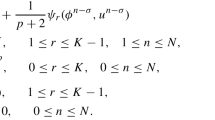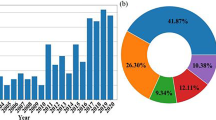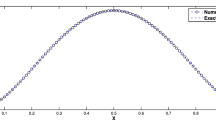Abstract
In this work, we present the explicit strong stability-preserving (SSP) three-derivative Runge–Kutta (ThDRK) methods and propose the order accuracy conditions for ThDRK methods by Albrecht’s approach. Additionally, we develop the SSP theory based on the new Taylor series condition for the ThDRK methods and find its optimal SSP coefficient with the corresponding parameters. By comparing with two-derivative Runge–Kutta (TDRK) methods, Runge–Kutta (RK) methods and second derivative general linear methods (SGLMs), the theoretical and numerical results show that the ThDRK methods have the largest effective SSP coefficient for the order accuracy (\(3\le p\le 5\)). The numerical experiments reveal that the ThDRK methods maintain the designed order of convergence on the linear advection and Euler equation, and indicate the ThDRK methods have effective computational cost.


Similar content being viewed by others
Availability of data and materials
Data and materials for this study may be provided by the corresponding author upon reasonable request.
References
Albrecht P (1987) A new theoretical approach to Runge–Kutta methods. SIAM J Numer Anal 24(2):391–406. https://doi.org/10.1137/0724030
Albrecht P (1996) The Runge–Kutta theory in a nutshell. SIAM J Numer Anal 33(5):1712–1735. https://doi.org/10.1137/S0036142994260872
Bresten C, Gottlieb S, Grant ZJ, Higgs D, Ketcheson DI, Németh A (2017) Explicit strong stability preserving multistep Runge–Kutta methods. Math Comput 86(304):747–769. https://doi.org/10.1090/mcom/3115
Butcher JC (1972) An algebraic theory of integration methods. Math Comput 26(117):79–106. https://doi.org/10.1090/S0025-5718-1972-0305608-0
Butcher JC (2010) Trees and numerical methods for ordinary differential equations. Numer Algorithm 53(2):153–170. https://doi.org/10.1007/s11075-009-9285-0
Butcher JC (2016) Numerical methods for ordinary differential equations. Wiley. https://doi.org/10.1002/9781119121534
Butcher JC, Tracogna S (1997) Order conditions for two-step Runge–Kutta methods. Appl Numer Math 24(2–3):351–364. https://doi.org/10.1016/S0168-9274(97)00032-9
Butcher JC, Tracogna S (1997) Order conditions for two-step Runge–Kutta methods. Appl Numer Math 24(2–3):351–364. https://doi.org/10.1016/S0168-9274(97)00032-9
Chan RP, Tsai AY (2010) On explicit two-derivative Runge–Kutta methods. Numer Algorithm 53(2):171–194. https://doi.org/10.1007/s11075-009-9349-1
Christlieb AJ, Gottlieb S, Grant ZJ, Seal DC (2016) Explicit strong stability preserving multistage two-derivative time-stepping schemes. J Sci Comput 68(3):914–942. https://doi.org/10.1007/s10915-016-0164-2
D’Ambrosio R, Jackiewicz Z (2010) Continuous two-step Runge–Kutta methods for ordinary differential equations. Numer Algorithm 54(2):169–193. https://doi.org/10.1007/s11075-009-9329-5
Gottlieb S, Ketcheson DI (2016) Time discretization techniques. Handb Numer Anal 17:549–583. https://doi.org/10.1016/bs.hna.2016.08.001
Gottlieb S, Ketcheson DI, Shu CW (2011) Strong stability preserving Runge–Kutta and multistep time discretizations. World Sci. https://doi.org/10.1142/7498
Gottlieb S, Grant ZJ, Hu J, Shu R (2022) High order strong stability preserving multiderivative implicit and IMEX Runge–Kutta methods with asymptotic preserving properties. SIAM J Numer Anal 60(1):423–449. https://doi.org/10.1137/21M1403175
Grant ZJ, Gottlieb S, Seal DC (2019) A strong stability preserving analysis for explicit multistage two-derivative time-stepping schemes based on Taylor series conditions. Commun Appl Math Comput 1(1):21–59. https://doi.org/10.1007/s42967-019-0001-3
Isherwood L, Grant ZJ, Gottlieb S (2018) Strong stability preserving integrating factor Runge–Kutta methods. SIAM J Numer Anal 56(6):3276–3307. https://doi.org/10.1137/17M1143290
Isherwood L, Grant ZJ, Gottlieb S (2019) Strong stability preserving integrating factor two-step Runge–Kutta methods. J Sci Comput 81(3):1446–1471. https://doi.org/10.1007/s10915-019-01046-6
Izzo G, Jackiewicz Z (2015) Strong stability preserving general linear methods. J Sci Comput 65(1):271–298. https://doi.org/10.1007/s10915-014-9961-7
Jackiewicz Z (2009) General linear methods for ordinary differential equations. Wiley. https://doi.org/10.1002/9780470522165
Ketcheson DI (2008) Highly efficient strong stability-preserving Runge–Kutta methods with low-storage implementations. SIAM J Sci Comput 30(4):2113–2136. https://doi.org/10.1137/07070485X
Ketcheson DI, Macdonald CB, Gottlieb S (2009) Optimal implicit strong stability preserving Runge–Kutta methods. Appl Numer Math 59(2):373–392. https://doi.org/10.1016/j.apnum.2008.03.034
Ketcheson DI, Gottlieb S, Macdonald CB (2011) Strong stability preserving two-step Runge–Kutta methods. SIAM J Numer Anal 49(6):2618–2639. https://doi.org/10.1137/10080960X
Lou S, Yan C, Ma LB, Jiang ZH (2020) The flux reconstruction method with Lax–Wendroff type temporal discretization for hyperbolic conservation laws. J Sci Comput 82(2):1–25. https://doi.org/10.1007/s10915-020-01146-8
Moradi A, Farzi J, Abdi A (2019) Strong stability preserving second derivative general linear methods. J Sci Comput 81(1):392–435. https://doi.org/10.1007/s10915-019-01021-1
Moradi A, Farzi J, Abdi A (2021) Order conditions for second derivative general linear methods. J Comput Appl Math 387:112488. https://doi.org/10.1016/j.cam.2019.112488
Moradi A, Abdi A, Hojjati G (2022) Strong stability preserving implicit and implicit-explicit second derivative general linear methods with RK stability. Comput Appl Math 41(4):135. https://doi.org/10.1007/s40314-022-01839-w
Movahedinejad A, Hojjati G, Abdi A (2016) Second derivative general linear methods with inherent Runge–Kutta stability. Numer Algorithm 73(2):371–389. https://doi.org/10.1007/s11075-016-0099-6
Ökten Turaci M, Öziş T (2017) Derivation of three-derivative Runge–Kutta methods. Numer Algorithm 74(1):247–265. https://doi.org/10.1007/s11075-016-0147-2
Ökten Turaci M, Öziş T (2018) On explicit two-derivative two-step Runge–Kutta methods. Comput Appl Math 37(5):6920–6954. https://doi.org/10.1007/s40314-018-0719-y
Qin XY (2022) Explicit three-derivative Runge–Kutta methods code. https://github.com/aerfa-buaa/Explicit-Three-Derivative-Runge-Kutta-Methods-ThDRK
Qiu J, Shu CW (2003) Finite difference WENO schemes with Lax–Wendroff-type time discretizations. SIAM J Sci Comput 24(6):2185–2198. https://doi.org/10.1137/S1064827502412504
Reynoso GF, Gottlieb S, Grant Z (2017) Strong stability preserving sixth order two-derivative Runge–Kutta methods. AIP Conf Proc 1863:560068. https://doi.org/10.1063/1.4992751
Seal DC, Güçlü Y, Christlieb AJ (2014) High-order multiderivative time integrators for hyperbolic conservation laws. J Sci Comput 60(1):101–140. https://doi.org/10.1007/s10915-013-9787-8
Shu CW, Osher S (1988) Efficient implementation of essentially non-oscillatory shock-capturing schemes. J Comput Phys 77(2):439–471. https://doi.org/10.1016/0021-9991(88)90177-5
Spiteri RJ, Ruuth SJ (2002) A new class of optimal high-order strong-stability-preserving time discretization methods. SIAM J Numer Anal 40(2):469–491. https://doi.org/10.1137/S0036142901389025
Sun Z, Shu CW (2019) Strong stability of explicit Runge–Kutta time discretizations. SIAM J Numer Anal 57(3):1158–1182. https://doi.org/10.1137/18M122892X
Wang P (2015) A-stable Runge–Kutta methods for stiff stochastic differential equations with multiplicative noise. Comput Appl Math 34(2):773–792. https://doi.org/10.1007/s40314-014-0140-0
Wen J, Xiao A, Huang C (2020) Highly stable multistep Runge–Kutta methods for volterra integral equations. Comput Appl Math 39(4):1–23. https://doi.org/10.1007/s40314-020-01351-z
Funding
Project supported by the National Natural Science Foundation of China (No. 11721202).
Author information
Authors and Affiliations
Corresponding author
Ethics declarations
Conflict of interest
The authors declare that they do not have any financial interests or personal relationships that would improperly influence ther work.
Ethics approval
Not applicable.
Consent to participate
Not applicable.
Consent for publication
Not applicable.
Code availability
Not applicable.
Additional information
Communicated by Zhaosheng Feng.
Publisher's Note
Springer Nature remains neutral with regard to jurisdictional claims in published maps and institutional affiliations.
Appendix A Order conditions for the ThDRK methods
Appendix A Order conditions for the ThDRK methods
We alternate recursively compute the global stage errors \({\varvec{\epsilon }}\) and the derivative \({\varvec{\delta }}\), \({\varvec{\sigma }}\) of the global stage errors. The terms and conditions for each order accuracy of the ThDRK methods are described below.
First:
Second:

Third:

Fourth:

Fifth:

Sixth:

Seventh:

Rights and permissions
Springer Nature or its licensor (e.g. a society or other partner) holds exclusive rights to this article under a publishing agreement with the author(s) or other rightsholder(s); author self-archiving of the accepted manuscript version of this article is solely governed by the terms of such publishing agreement and applicable law.
About this article
Cite this article
Qin, X., Jiang, Z., Yu, J. et al. Strong stability-preserving three-derivative Runge–Kutta methods. Comp. Appl. Math. 42, 171 (2023). https://doi.org/10.1007/s40314-023-02285-y
Received:
Revised:
Accepted:
Published:
DOI: https://doi.org/10.1007/s40314-023-02285-y




